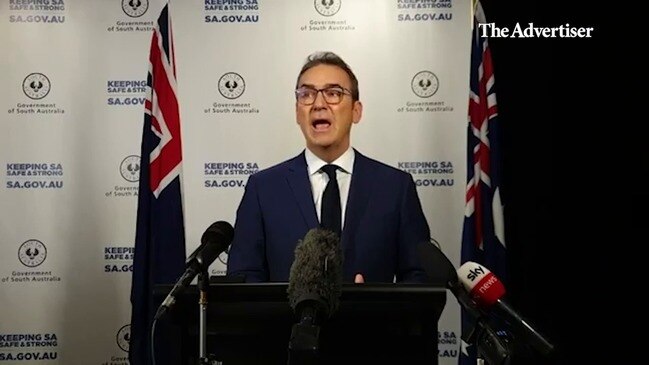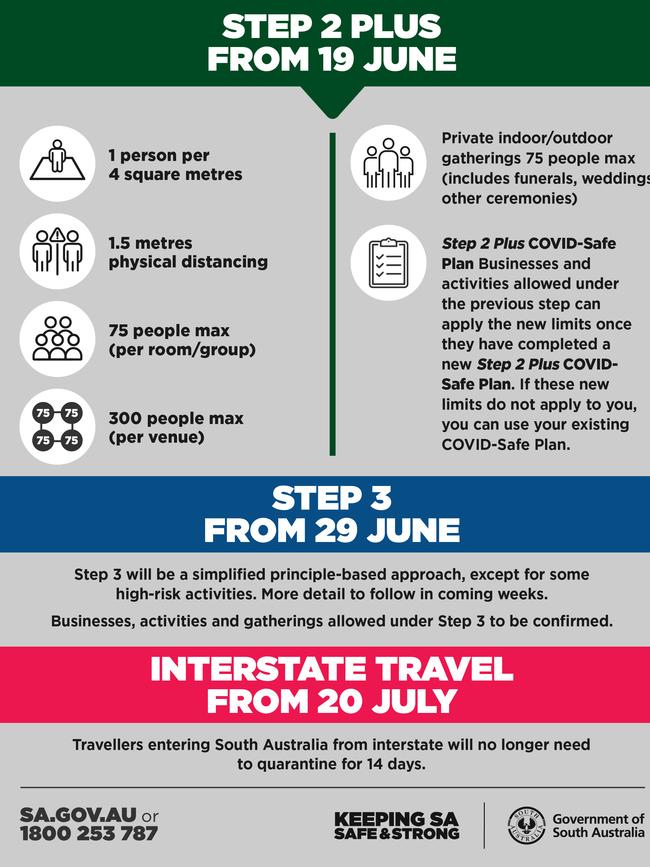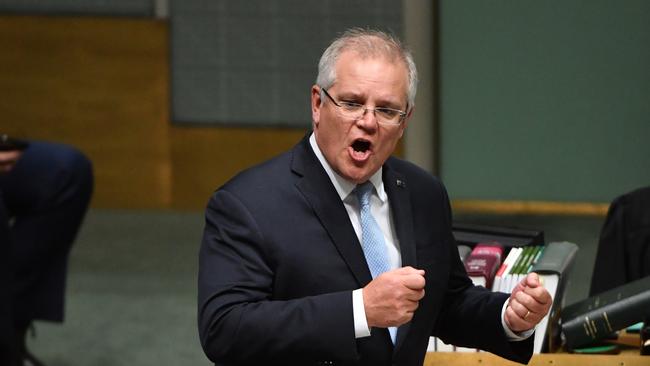Date set for border opening as more freedom looms
A date has been set for South Australia to open its doors to the rest of the nation while there’ll be more local freedoms at home within days.

Coronavirus News
Don't miss out on the headlines from Coronavirus News. Followed categories will be added to My News.
- Marshall’s watershed moment for re-election
- Are you getting the most from your Advertiser subscription?
South Australian borders will reopen for all states and territories next month.
Strict closures will be lifted and interstate travel will resume on July 20, Premier Steven Marshall announced yesterday. Thousands of international students could also start returning to SA under a trial for “secure corridors”.
A two-tranche approach to interstate travel restrictions – with safer states Western Australia, the ACT, the Northern Territory, Tasmania and possibly Queensland to go first – is still on the cards.
However, a legal hurdle raised during yesterday’s national Cabinet meeting will need to be overcome first.
Mr Marshall hinted that legal advice was necessary to determine if travel bubbles with certain states and territories, and not others, were possible.
“We don’t want to restrict people’s movement if it is not required,” Mr Marshall said. “We do need to get some final legal advice before we take any further action.”

Police Commissioner Grant Stevens said Crown advice was being sought over “constitutional issues” associated with border restriction.
Section 117 of the Constitution protects against discrimination on the basis of a person’s state of residence, which could emerge as an issue in the event of travel bubbles.
Mr Marshall said the plans unveiled yesterday would allow people to enter SA without 14 days of self-isolation from July 20 – but it would depend on other states as to whether or not they would allow South Australians in their states. WA, ACT, Queensland, Tasmania and the NT are yet to announce when their borders will reopen to non-essential interstate travellers.
Business SA chief executive Martin Haese, pictured, said SA had not gone early enough with border openings.
His sense of urgency was shared by Prime Minister Scott Morrison, who said: “If you can’t come to your state from Sydney then no one is coming to your state from Singapore.
“If your borders open for international students then you have to open up borders for Australians.”
South Australia will be one of the states where the international student re-entry pilot could begin next month after its borders reopened.
International students were worth about $1.92 billion to the SA economy last year.
About 6700 foreign students enrolled to study in SA were caught outside the country when the borders closed in March, while 31,000 were already here. It is understood states and universities would have to arrange flights and students would have to quarantine on arrival under the plan.
New life as virus lockdown eases
By Andrew Hough, Miles Kemp, Claire Bickers
South Australians will enjoy more freedom within days as a relaxation of coronavirus social-distancing rules paves the way for a wide range of restrictions to be eased.
The State Government announced the capacity of indoor venues will be dramatically increased from Friday as authorities attempt to kickstart the economy.
But interstate travel is banned until the state’s borders reopen on Monday, July 20, after the school holidays.
As SA Health revealed the state had recorded 17 days of zero COVID-19 daily cases, the Government’s transition committee fast-tracked the state’s reopening, authorising an easing of border restrictions and an increase of venue numbers from a 20-person-an- area limit to a maximum of 75 patrons a room.
After three months of COVID-19 lockdowns, large hospitality venues are the big winners as the total venue capacity is increased from 80 to 300. The changes, dubbed stage 2.5 by Premier Steven Marshall, mean weddings, funerals, fixed-equipment gyms, restaurants, “private gatherings” and other indoor venues can host bigger functions.
Up to 10,000 people will also be allowed in some stadiums from next month. Adelaide Oval management will hold talks with SA Health about being able to boost its capacity after tonight’s historic Showdown crowd “test case”.
MORE NEWS
COVID’s silver-lining – Flu deaths plunge 91%
Miracle patient’s long trip home
How the COVID Showdown rules work
A move to a “COVID-safe” Stage 3 will be accelerated by five days to June 29. On that date, hospitality headcounts will be scrapped, some gaming will return, food courts will reopen and other contact sports will start but social-distancing rules, including one person per 4 sqm, still apply. SA Health officials are still investigating how fitness class numbers can be increased from 10 patrons. Further investigations are continuing on how swimming and dance schools, nightclubs as well as music festivals can safely operate.
Officials also say further plans are being drawn up on spas and saunas, indoor playgrounds, amusement arcades as well as shisha or hookah bars. From June 25, outdoor sport competition can start as well as indoor training.
Announcing the new rules alongside Police Commissioner Grant Stevens, chief public health officer, Professor Nicola Spurrier, Mr Marshall said they were “rewards for our citizens” after a widespread backlash.
“This will be a great relief to so many people,” he said.
He said the rule changes came after no community transmission in almost three months, continual low or no cases and high testing rates.
“It is only possible because of the continued co-operation that we have had from the people of South Australia,” he said.

Prime Minister Scott Morrison said leaders agreed reopening Australia would not be “halted” by small outbreaks.
All agreed to pursue a “suppression” course,” he said. “We are not going to (be) trapped by the goal of eradication.
“The emergence of cases is not something that will necessarily require … the opening up of the economy to be halted.”
Mr Stevens, who is also state co-ordinator, said he was acutely aware of community “frustrations” but said officials were moving quickly.
Urging people to continue to maintain social distancing and good hygiene, Prof Spurrier said many different voices were considered.
“We are now able to lift … these restrictions but it does take a lot of time because we all need to be COVID-safe,” she said.
She said SA Health wanted to reduce a second-wave risk that would “put way too much pressure” on society and trigger new restrictions. “My medical advice has remained the same – COVID is still a potential threat for Australia,” she said.
Labor leader Peter Malinauskas urged consistent rules.
